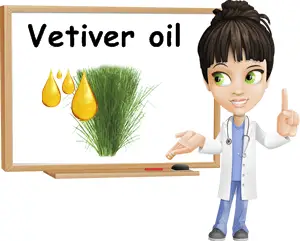Vetiver oil is the essential oil extracted mainly from the roots of the vetiver plant (Chrysopogon zizanioides), a type of grass originating in India.
Vetiver is a Gramineae, a so-called true grass, and is related to wheat, maize, barley, sorghum, rice, rye, millet and other domesticated cereal crops as well as with lemongrass, citronella and so on. Vetiver is quite a sturdy plant, resistant to drought, low temperatures and sun-loving.
Its derivate essential oil is commonly used for skin care, in aromatherapy for inducing relaxation, relieving insomnia, nervousness as well as a natural insect repellent. Moreover, research on the properties of vetiver essential oil reveals it can potentially help manage anxiety and other nervous system disorders, improve mood and calm anger outbursts.

What does vetiver look like?
The vetiver plant is and looks like a true grass. It has tall stems and 150 cm long, upright, thin green leaves that resemble grass blades. Overall, vetiver plants look a lot like tufts of grass. They produce brown flowers resembling young wheat heads. Vetiver plants have strong roots that grow downwards, reaching up to 4 meters in length.
These strong roots allow for the plant to be surprisingly resilient to drought, below zero temperatures as well as flooding and fixate the soil, preventing erosion.
What does vetiver essential oil look and smell like?
Vetiver essential oil is made from the roots of the plant. The roots used for oil production are generally harvested when the plant reaches 2 years of age. They are then dried and put into water to be distilled in order to extract the natural chemical constituents that give the oil its smell. This results in a golden-brown, thick oil with a unique, yet strong fragrance.
Vetiver oil has a rich, earthy, woody, yet somewhat sweet, either smoky or slightly floral fragrance, depending on the area where it was cultivated and soil peculiarities.
What is vetiver essential oil used for and how?
Vetiver essential oil is made for external use only for aromatherapy practices and should not be ingested. There are over 100 constituents in vetiver essential oil responsible for both the fragrance and health effects of the plant, notably khusimol, khusimene, vetiselineol, alpha-vetivone, beta-vetivone, beta-vetivenene, isovalencenol, isovalencenol, terpinen-4-ol (also found in tea tree oil), beta-humulene, γ-selinene, cadinenes, valencene, etc (Constituents of south Indian vetiver oils). Khusimol is one of the preominant compounds.

What is Vetiver Essential Oil good for?
Here are the most impressive 6 properties and uses of vetiver and its derivate essential oil:
1) Aromatherapy
Vetiver oil is principally used in aromatherapy for inducing relaxation, relieving anxiety, nervousness and irritability, calming anger outbursts, improving mood and relieving insomnia.
Animal studies confirm that the scent of vetiver oil boasts anxiolytic effects, meaning it can help relieve anxiety (source), with an effect comparable to that of regular anti-anxiety medication.
As a result of its both mild sedative and restorative action on the nervous system, the distinct fragrance of vetiver essential oil can efficiently relieve insomnia, improve sleep quality and thus contribute to better mood , hence its use for improving depression symptoms or anger problems.
Using the oil for improving mood and managing nerve disorders should come as a complementary treatment and not replace medical recommendations.
2) Used in skin care products and for scar healing
Some specialists advocate vetiver essential oil as a natural skin remedy for acne scars, stretch marks and other unaesthetic skin marks, spots or signs. The oil is said to help clear spots and make scars or stretch marks fade away. It is recommended to add a few drops of vetiver essential oil to your bath water, body or face lotion or other skin care products for best results. Avoid ingestion.
3) Antiseptic and antifungal action
Vetiver essential oil contains chemical compounds with a natural antiseptic and antifungal action. The antiseptic properties of the roots and their derivate essential oil have lead to the use of vetiver essential oil in skin care products that aim to improve the aspect of scars and get rid of acne.
4) Natural insect repellent
Several studies have found that vetiver extracts and essential oil could be used to repel termites as a result of the naturally-occurring chemical compounds in the roots of the plant. But while diffusing the essential oil over wooden objects or furniture helps protect them against termites, the plant itself has no such effect because it its roots do not release their distinct odour (given by chemical constituents) unless damaged.
5) Fights soil erosion
The vetiver plant is well-known for its ability to stabilize soil and prevent erosion. This is a result of the plant’s deep roots (up to 4 meters long) which attach to the soil and keep it in place. If you live in a warm tropical, subtropical or Mediterranean climate with sandy loam or clay loam soil, then you could plant vetiver around your house to help stabilize the soil and prevent erosion.
The plant is tolerant to drought, sun-loving and even frost-resistant, making it quite low maintenance. Moreover, its deep roots attract water into the soil to better stabilize it and have also been found to cleanse water sources by absorbing heavy metals from it, hence the choice of planting it on river banks.
6) Used as animal feed, roof thatch and for ropes
Although primarily used in perfumery, for the production of some of the priciest perfumes, vetiver boasts other uses as well. The leaves are used to feed cattle, sheep, horses, goats and most domestic animals or as roof thatch for houses as a result of their rigid, fibrous texture. Ropes and strings are commonly made from vetiver grass as well.
How to use vetiver essential oil
Although it is non-toxic and non-irritant, vetiver oil should not be ingested. Instead, you can put a few drops in an essential oil diffuser either alone or in combination with other essential oils such as jasmine or citronella and let it diffuse the fragrance in the room.
Alternatively, you can rub your hands with a drop of the oil and then breathe in the fragrance.
I like to put a drop of vetiver essential oil on a cotton handkerchief and put it under my pillow at night. I also do this with lavender to help me sleep better when I’m having trouble going to sleep.
Sometimes, I apply a drop on the back of my pillow and let it release a mild, pleasant fragrance all night long so I wake up relaxed and refreshed.
